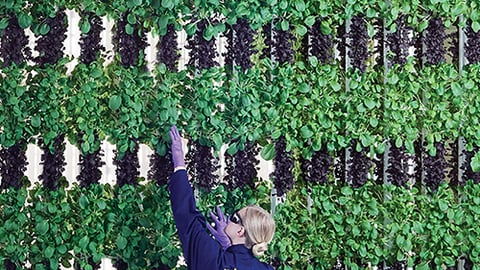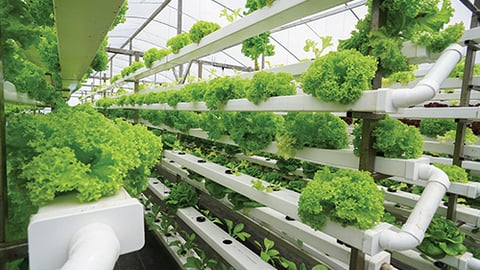Safeway Expands Produce Offering Via Vertical Farming
Safeway is making healthy greens more accessible to smaller communities by welcoming produce from vertical farming company Plenty to 17 more stores across Northern California — bringing the total number of stores carrying Plenty products in the region to 53.
The additional Albertsons-owned stores, which include Safeway and Vons, are part of a multiyear agreement between the two companies to expand Plenty produce into more than 430 Albertsons-owned stores across the state of California. The new store locations are primarily in smaller communities, making Plenty the first indoor vertically farmed produce available to these shoppers.
Plenty’s plant scientists, engineers and farmers have developed its indoor vertical-farming technology to grow nutrient-rich and pesticide-free plants year-round. Using data analytics, machine learning and customized lighting, the farming tech company is able to coax the natural flavors and nutrients from the plants. Plenty grows multiple crops in a building the size of a retail box store, yielding hundreds of acres using a fraction of the water and other precious resources.
In addition to debuting in more store locations, Plenty is debuting a first-of-its-kind Text-a-Farmer feature, on display next to its greens in stores. In the age of COVID, when human contact has been limited and in-person sampling restricted, Plenty’s texting feature connects with shoppers directly to answer questions and share information. Text-a-Farmer lets shoppers text questions while shopping and receive an answer directly from a Plenty farmer. Questions can cover anything related to Plenty and its produce, including “Do you use pesticides on your leafy greens,” “Is your packaging recyclable,” and “How do I keep my greens fresh longer?”
“At Plenty, we’re proud of the fresh, flavorful greens we grow in our farm, and of our transparent growing process, which lets us track a plant from seed to kitchen,” said Nate Storey, co-founder and chief science officer at San Francisco-based Plenty. “The Text-a-Farmer program is one way we can directly connect with customers and hear their personal questions and experiences. We’re always excited to engage with shoppers and help them learn more about our company and the delicious produce we grow.”
All of the store locations carry four of Plenty’s products:
- Baby Arugula: a bold baby arugula with spice and subtle hints of summer citrus and black pepper.
- Baby Kale: a velvety soft baby kale highlighted by bright notes and a smooth finish.
- Crispy Lettuce: a crispy leaf delivering a fresh, clean crunch for creative recipes.
- Mizuna Mix: a crunchy, colorful mix of tatsoi and mizuna that brings a mustardy heat to the table.
The produce from farming tech companies has become highly popular among consumers at a time when more people are looking to keep healthy via the foods they eat — and food retailers are taking notice. For example, Hamilton, Ohio-based 80 Acres Farms just revealed that it was supplying fresh produce to 316 Kroger locations across Ohio, Indiana and Kentucky. Also, besides Safeway, Plenty’s produce can be found in Whole Foods Market.
More visibility means that Plenty and other ag tech operations have been securing huge funding from venture capitalists. For instance, Plenty raised $140 million in a Series D financing round in October 2020 to cultivate its growth plans. The vertical farming startup is currently building the world's highest-output vertical indoor farm, in Compton, California.
Boise, Idaho-based Albertsons operates 2,252 retail stores with 1,725 pharmacies, 398 associated fuel centers, 22 dedicated distribution centers and 20 manufacturing facilities. The company’s stores predominantly operate under the banners Albertsons, Safeway, Vons, Pavilions, Randalls, Tom Thumb, Carrs, Jewel-Osco, Acme, Shaw’s, Star Market, United Supermarkets, Market Street and Haggen. The company is No. 8 on The PG 100, Progressive Grocer’s 2020 list of the top food and consumables retailers in North America. The Kroger Co., based in Cincinnati, and Austin, Texas-based Whole Foods, which is owned by Seattle-based Amazon, are Nos. 3 and 24, respectively, on PG's list, while Amazon is No. 2.











